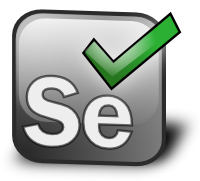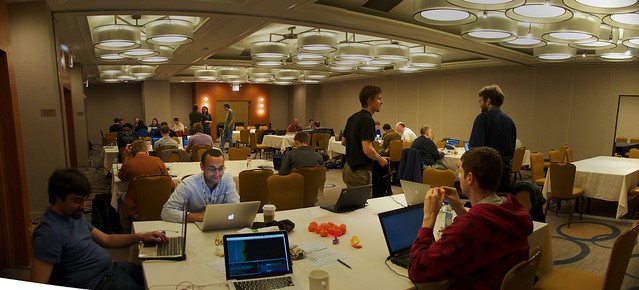![[RSS]](/static/img/feed-icon-14x14.2168a573d0d4.png) Conservancy Blog
Conservancy Blog
Displaying posts
by Molly deBlanc
![]()
Conservancy at LibrePlanet 2018
by on March 22, 2018
March 24-25th hundreds of free software activists, community managers, hackers, legal experts, and all around fans will meet in Cambridge, MA for LibrePlanet 2018, the Free Software Foundation's annual conference and members meeting.
In addition to everything else happening there, Conservancy's own Bradley Kuhn, Brett Smith, Karen Sandler, and Denver Gingerich -- our part-time compliance engineer -- will all be speaking.
Topics covered include copyleft, the usibility of the GPL, medical devices, and free software in business.
State of the copyleft union
Bradley Kuhn, Distinguished Technologist
The license-importance divide seems almost generational: the older generation cares about licenses, and the younger generation does not. Yet, the historical focus on licensing in FLOSS, while occasionally prone to pedantry to a degree only developers can love, stemmed from serious governance considerations regarding how community members interact.
Copyleft was invented to solve the many problems of project governance, assuring the rights of users and creating equal footing for all contributors. The licensing infrastructure today also has increased in complexity, with proprietary relicensing business models, excessive use of CLAs, and tricky clauses on top of existing licenses.
Given this climate, how do we understand if copyleft is succeeding? This talk explores historical motivations and modern reactions to these licensing matters, and digs into understanding how policies have impacted Free Software communities for both good and ill.
A usability study of the GPL
Brett Smith, Director of Strategic Initiatives
We want software creators to use the GPL and its cousin licenses. We also know that people make mistakes in the process, or don’t even try because they’ve heard it’s "too complicated." Just as we do when we develop software, we would do well to study these failures and use them as opportunities to improve the usability of the GPL. This talk aims to start that process by identifying some known problems and considering some possible solutions. (None of these solutions are a new version of the license!)
Copyleft, Diversity & Critical Infrastructure
Karen Sandler, Executive Director
GPL enforcement and Outreachy are the two most visible and controversial programs that Conservancy undertakes. In this talk, Karen will explore how the programs fit together in the context of software freedom generally. Karen will review her work around medical devices and critical infrastructure and show how seemingly disparate initiatives fit into a single advocacy narrative.
Freedom, devices, and health
Mad Price Ball, Rachel Kalmar, Dana Lewis, Karen Sandler
When it comes to health, freedom is literally visceral. How do the principles of freedom apply to the devices used for medicine, health, and wellness? Moderated by Mad Price Ball, a Shuttleworth Foundation Fellow, this panel introduces leaders that bridge industry, community, and individual experiences. Rachel Kalmar (Berkman Klein Center), uses her experience with sensors and wearables to confront how devices and their data interact with a larger ecosystem. Dana Lewis (OpenAPS) connects us to health communities, and her work with the Nightscout project and patient-led efforts in type 1 diabetes. Karen Sandler (Software Freedom Conservancy) shares her experience as an individual with a device close to her heart: a defibrillator she uses, as a matter of life or death -- and she cannot get the source code to it. Join us to learn about how freedom matters for devices in health.
-
In business: Keeping free software sustainable
Denver Gingerich, Compliance Engineer
Starting a business is a big decision, and choosing to share its results with the world is perhaps bigger still. Denver started JMP early last year, and faced this very choice, deciding to release all of JMP's code as free software and to charge money to use the instance he runs. In this session, Denver will describe why he chose to build a free software business, and will discuss the details of the business model he arrived at, alongside other business models for free software companies.
Few contributors are paid to work on free software today, and far fewer are paid by non-profit organizations (or even by small businesses). It is imperative for us to explore how we can sell free software, especially through non-profits and small businesses, so we can bring freedom to more people and, just as importantly, build sustainable futures for our contributors.
More information is available on the LibrePlanet 2018 website.
Organized by the FSF, LibrePlanet is focused entirely on user freedom. We hope to see you there, in our talks or at the Conservancy booth in the exhibit hall.
Conferences, Standards, and Sponsorships: Selenium’s Work in 2016
by on January 12, 2017
This series covers new developments and exciting projects taken on by Conservancy member projects. To learn more about Conservancy member projects, or the non-profit infrastructure support and services offered by the Conservancy, check out Conservancy’s Projects page. Please support Conservancy so we can continue to help all this important software.

SeleniumConf UK wrapped up November 16th! For three days, Selenium developers and enthusiasts got together to share ideas, work together, and spend time with other community members in London. This year, there were three amazing keynotes, a diverse group of twenty-six speakers, and four full day workshops. Talks are already posted online, and you can watch them on the SeleniumConf UK YouTube channel.
Selenium is a freely-licensed browser automation tool. While it’s most frequently used for testing purposes, it has capabilities beyond that. These include scaling and distributing scripts across environments and reproducing bugs. It’s currently functional in eleven languages, including C#, JavaScript, Python, and Ruby. All the major browsers ship with support for Selenium out of the box now, too.
Selenium has been a Conservancy project since 2010. Starting in 2011, Conservancy began to support Selenium’s efforts to host their own conferences, which have grown over the years to the successful events we know today. As a tool, Selenium has become an industry standard, with users ranging from individuals plugging away at their own projects to some of the largest companies in tech.
Selenium demonstrates a strong commitment to fiscal responsibility, and the project leadership looks to sustain Selenium beyond individual donations. In order to help power the project, the team promotes and manages large corporate sponsorships.
Earlier this year, Selenium 3.0 was released, replacing the original Selenium Core—Jason Huggins started developing the Core in 2004—with one based on Selenium WebDriver. Much like Selenium itself, WebDriver is becoming a standard in its own right. The World Wide Web Consortium (W3C) has a draft specification for browser automation based on Selenium WebDriver, and members of the Selenium project are on the team to make this an official recommendation.
Interested in getting involved with Selenium? There are lots of ways to contribute to the project—check out the documentation for details! You can also help them along by donating to Selenium.
Code Sprints, Contractors, and Commits: PyPy in 2016
by on December 1, 2016
This series covers new developments and exciting projects taken on by Conservancy member projects. To learn more about Conservancy member projects, or the non-profit infrastructure support and services offered by the Conservancy, check out Conservancy’s Projects page!
Thanks to the generous support of donors and contributors, PyPy contracted Ronan Lamy at the beginning of June to help move forward work on Py3k. Lamy has been a Pypy core developer since 2012, and his work in refactoring old code has been invaluable to the project.
PyPy is an implementation of Python, one of the most popular programming languages in the world. It’s fast and light without sacrificing features available in CPython and other systems used to execute programs written in Python.

PyPy sprint at PyCon 2012
Courtesy of Taavi Burns. CC-BY
The Py3k project is important for the future of PyPy. Since the publication of Python 3, coders, developers, and organizations have been tackling the technical and social challenges of updating from Python 2. For PyPy, supporting Python 3 means supporting the Python community—those wanting to use PyPy will be able to work with projects using Python 2 and Python 3. In addition to donations received through the Conservancy’s fiscal sponsorship, a $200,000 award from the Mozilla Foundation to Baroque Software is helping to make a Python 3.5 PyPy a reality.
Over June, Lamy made hundreds of commits to PyPy—creating clean code, fixing translations, increasing testing capabilities, and expanding Windows functionality. Rather relentless, he combed through commits and contributions, chasing down everything from unnecessarily hacky code to serious problems. Without the financial support of donors, this work would likely remain unfinished. Lamy spoke at PyCon UK this September, where he talked about the current state of PyPy.
Currently, PyPy is a “good and… usable drop-in replacement for CPython” for 2.7, and during 2017 that usability should extend to Python 3.3 and 3.5. In order to achieve this goal, Python 3.5 will continue to be a major priority for PyPy in the months ahead, as well as JIT code generation. Additionally, there are a number of “side projects,” like RevDB.
Interested in getting involved with PyPy? There are lots of ways to contribute to the project—check out the documentation for details! You can also help them along by donating to the project.
